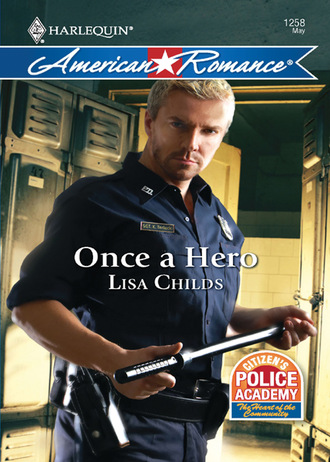
Полная версия
Once a Hero
“I’m surprised you walked in at all,” the older woman mused, “let alone with Sergeant Terlecki.” She pulled darts from the board and stepped back. Like Amy, she had long blond hair, but a couple of silver strands shone among the platinum. “I thought he’d finally gotten rid of you.”
Erin turned toward her, surprised by her barely veiled animosity. She expected it from police officers, but not civilians, although some of them weren’t shy about telling her she was wrong. “I’m sorry. I don’t remember your name.”
“Marla. Marla Halliday.” She waited, as if Erin was supposed to recognize her name. Then she added, “My son is a police officer—Sergeant Bartholomew ‘Billy’ Halliday with the vice unit.”
The name still meant nothing to Erin—it hadn’t come up in any of her research—but the woman’s attitude made complete sense now. “Oh.”
“Yeah. Oh. When you attack the department, you’re attacking every one of those hardworking officers—not just Sergeant Terlecki,” Marla admonished, with a mother’s fierce protectiveness.
“I’m sure your son is a fine officer, but—”
“That’s your problem, honey. You’re sure regardless of the facts. You’re sure even when you’re wrong.” Marla’s porcelain skin reddened. “Not that my son isn’t a fine officer, because he is. But he’s not Sergeant Terlecki.”
“Then he is a fine officer.” He wouldn’t frame a man for a crime he hadn’t committed just to pad his arrest record and further his career, as Kent Terlecki had.
“But Billy’s not a hero,” his mother said.
“You’re saying Sergeant Terlecki—Kent Terlecki is a hero?”
Marla nodded. “Why do you think they call him Bullet?”
“I have no idea.” The mystery of his nickname had been bugging her since she had moved to the west Michigan town of Lakewood. “Why don’t you tell me?”
“Hey, Ms. Halliday,” Kent said as he joined them.
“Do you have some kind of radar for whenever I ask a question?” Erin asked, her stomach knotted with frustration over how close she’d come to learning one of his secrets before he’d thwarted her again.
“You have to be careful of this one,” Kent said to Marla Halliday. “She tries to interview everyone.”
“No interview here,” Marla said. “We were just going to play darts.” Her blue eyes twinkled. Kent grimaced, but she ignored him. “Here, Erin, why don’t you go first?”
Erin closed her fingers around the proffered bunch of brightly colored darts. She chose one to throw, then turned to the board to find someone had pinned a blown-up picture of her there.
Not someone. Him.
Kent Terlecki was no hero.
Chapter Two
A chuckle at the shocked expression on her face rumbled in Kent’s chest, but he suppressed it. Instead he moved up behind her, then closed his hand around her fingers holding the dart.
“See?” he said as he lifted her hand and guided the throw. “A bull’s-eye is right between the eyes.”
“My eyes,” she muttered. As the dart pierced the paper across the bridge of her nose, she winced.
“Your chin and ears are five points, your mouth and cheeks ten and your—”
“I get the idea,” she interrupted, tugging her hand free and stepping away.
He hadn’t realized he was still holding her. Or that Billy’s mom had left them, to return to the others. Maybe it was good he wasn’t out in the field anymore. His instincts were not as sharp as they’d once been.
“And I get to you,” she said, “whether you’re willing to admit it or not.”
“Why?” He asked the question that had been nagging at him for a year.
“Why do I get to you?” she asked, her lips tilting up in a smug smile. “Or why aren’t you willing to tell the truth?”
“Why do you want to get to me?” he wondered. “I’m always the victim of your poison pen.”
“A little paranoid, Sergeant?” she teased, her dark eyes gleaming with amusement. And triumph.
He shook his head. “No. I used to think it wasn’t personal. That I was your target just because I represented the department.”
“Now you’re a martyr,” she quipped.
Remembering all those people who had tried to make him one, he suppressed a shudder. “God, no.”
“Oh, I forgot. You’re a hero,” she said. “That’s what Mrs. Halliday called you.”
The act that others called heroic had been sheer instinct—an instinct every cop had. He didn’t doubt that any one of his fellow officers would have done the same thing he had. “I’m no hero.”
“You don’t have to tell me that.”
He clenched his jaw so hard that his back teeth ground together. The woman was damn infuriating. “So it is personal.”
“You’re paranoid,” she said, but her gaze slid away from his.
“I heard what you said to the chief,” he admitted. “That you think I got my job by arresting innocent people. Why would you ask that?”
Sure, a lot of people claimed innocence, but no one he’d arrested had ever gotten away with their crimes. There’d always been too much evidence.
She shrugged. “How else would you have racked up the arrest record you have?”
“Because a lot of people commit crimes, Ms. Powell.” He stated what he considered obvious. “And I’m good at catching them.”
“Not anymore,” she taunted. “You sit behind a desk now. Your badge is all for show.”
Damn, she had struck that nerve he’d sworn she couldn’t. But she had actually spoken a grain of truth for once. Sometimes he did feel as if his badge were only a prop.
Her eyes sparkled as if she’d picked up on her direct hit to his pride. “Isn’t that what you wanted?” she asked. “To move up in the department, to get ahead?”
Getting desked was the last thing he’d wanted, but she was the last person to whom he would make that confession. “I know what you think of me, however unfounded,” Kent said. “Do you know what I think of you?”
“I can guess,” she replied, gesturing toward the dartboard.
He shook his head. “That wasn’t my idea. Someone else blew up the photo that runs with your byline, and pinned it there.” For him. He couldn’t claim that he hadn’t appreciated the gesture, though.
“I don’t care what you think of me, Sergeant,” she insisted.
“I’m going to tell you anyway,” he assured her.
“On the record or off?”
“Everything seems to go on the record with you.” Which he would come to regret, he knew.
“The public has a right to know….”
“Do they know about you?” he wondered. “That you’re ambitious to the point of ruthless? That you’ll use anything and anyone to further your career?”
She shook her head. “The person you just described sounds more like you. You don’t know me at all, Sergeant.”
“Then I guess we’re even.”
He finally admitted to himself the rest of his reason for allowing her into the program. He hadn’t wanted to change her opinion of just the department—he’d wanted to change her opinion of him, too. After a year of trying to deal with her, he should have known better. She was a lost cause.
ERIN TIPTOED INTO her dark apartment as if she were a kid sneaking in past curfew. And just like when she was a kid, she got caught. A lamp snapped on and flooded the living room with light.
Was this actually her apartment? Someone had tidied up. Books had been put back on the built-in cherry-wood shelves. Nothing but polish covered the hardwood floor. Even the cushions were on the couch. If not for having just unlocked the door, she would have suspected she’d stumbled into the wrong place.
“You’re late,” Kathryn Powell pointed out from where she sat primly, with her ankles crossed, on the sofa. Had her mother been sleeping like that or just sitting in the dark, waiting for her?
Erin blinked against the glare of the halogen bulb of the floor lamp. “I’m sorry.”
She should have called, but she hadn’t planned to go anywhere after class. Once she’d arrived at the Lighthouse, she hadn’t dared to call, what with the rowdy background noise. Her mother would have gotten the wrong idea. She tended to think the worst of her children.
Kathryn sniffed as if doubting Erin’s sincerity, and patted her short brown hair, not a single strand of which was displaced. “Your father is upset that I’m not home yet. He doesn’t want me making that long drive alone at this hour.”
Her parents lived about seventy miles southeast of Lakewood, in the austere Tudor home where Erin and her older brother, Mitchell, had grown up, in East Grand Rapids. Her brother had moved to Lakewood for college, and then, after dropping out, had stayed on because he’d liked being close to the water.
“You can stay over,” Erin offered, although her shoulders tensed at the thought of more quality time with Mom. Despite her mother’s best efforts, she would never be able to tidy up Erin’s life.
Kathryn shook her head. “I didn’t bring any of my things with me. I didn’t think your class was supposed to go so late.”
“It wasn’t.” It hadn’t. “Or I wouldn’t have signed up. You can stay, Mom. You can borrow something of mine.”
“No, I need to get home to your father.”
Mitchell had resented their mother’s devotion to Erin’s dad, his stepfather. That devotion used to inspire Erin to want that kind of love for herself someday, but she’d given up on her dream of love for her dream of justice. She had to clear Mitchell’s name and get his conviction overturned.
Erin passed through the neat living room to the hall, traveling a few steps to lean against the doorjamb of a bedroom. A night-light with a clown’s face illuminated a jumble of blocks and cars littering the racetrack rug. She ignored the clutter and focused on the bed and the small body curled into a ball under the covers.
“How was he?” she asked her mother, who had followed her—despite her desire to get home to her husband.
Kathryn sighed. “Hyperactive. And much too dependent on you.”
Guilt surpassed the defensiveness her mother usually inspired in her, and Erin admitted, “Maybe I shouldn’t have signed up for the course.”
Kathryn stepped closer and sniffed her hair. “You smell like you’ve been in a bar instead of a classroom.”
Erin shook her head. “Restaurant. It was easier to do interviews there than at the police department.” Or it would have been if she’d actually managed to speak to anyone without Sergeant Terlecki’s interference.
“You’re wasting your time,” her mother claimed. “If what you’re really looking for is some evidence to clear your brother, you’re not going to find anything.”
“Mom, I have to help him.” She would never be able to turn her back on her half brother the way her parents had. “Not just for Mitchell but for Jason, too. He can’t keep losing people he loves.”
That was why her nephew had become so attached to Erin—he was afraid she would leave him, as his father had four years ago and then his mother just last year. Mitchell’s girlfriend had found someone else, someone who didn’t want to raise another man’s child. So except for Erin’s parents, who tended to be more disapproving than affectionate, Erin was all the little boy had now.
“If you want to help your brother,” Kathryn advised, “then get him to admit the truth.”
“He’s not the one lying.” Kent Terlecki was. He had to be, or else her brother was one of those many people of whom Kent had spoken who committed crimes. And her older brother, her hero growing up, could not be a criminal.
A CURSE BROKE THE SILENCE in the living room, then books and CDs toppled to the hardwood floor as someone banged into a table in the dark. Kent snapped on a lamp, the light revealing the intruder: a tall, wiry guy with dark hair and a beard, dressed in dark clothes.
“What the hell—” Billy griped as he rubbed his knee. “Why are you sitting up in the dark?”
“Couldn’t sleep.”
“Your back bothering you?”
Kent shook his head. “Nope,” he said, ignoring the twinge along his spine. He had grown used to it over the past few years. “That’s not the pain keeping me awake.”
“The reporter?” Billy asked, snorting with disgust.
He nodded.
“I heard you brought her to the Lighthouse.” Billy dropped onto the old plaid couch across from the leather chair where Kent sat.
“You talked to your mom?” He grinned as he thought of Marla Halliday and how she’d led Erin to the dartboard. “Did you know she was joining the class?”
Billy shook his head. “I wish Paddy would’ve given me the heads-up he gave you about Powell.”
“You’re lucky you have a mom who wants to be involved in what you’re doing,” Kent told him. He’d been estranged from his folks since he’d chosen to go to the police academy instead of continuing the Terlecki tradition of working the family farm in northern Michigan.
“Mom can’t be involved in my life now,” Billy said, sinking deeper into the couch. Exhaustion blackened the skin beneath his eyes, making him look older than his twenty-six years. “You know how vice is….”
Deep cover. Streets. Bars. Abandoned houses and back alleys. Late nights and dangerous people. Kent had loved his years in vice. That was where he had made the majority of his arrests. Erin was delusional to think he’d had to frame innocent people; he hadn’t met many innocent people during that time. Or now. Somehow he suspected she was every bit as dangerous as the criminals he’d dealt with during his stint in vice.
She sure had it in for him for some reason, finding fault with everything he said or did.
“How come you came home?” Kent asked.
Not that Billy spent every night in the drug house the department had set up in the seedy area of Lakewood. The cover wasn’t so deep that the officers weren’t entitled to some downtime. Some officers even worked a regular twelve-hour shift. Billy wasn’t one of them.
The other man yawned and flopped his head against the back of the sofa. “I wanted to get some sleep without having to keep one eye open to watch my back.”
“I remember feeling like that,” Kent sympathized.
“You should still feel like that,” his roommate warned him, “with that reporter out to get you. Why the hell did you okay Erin Powell getting into the CPA?”
He sighed. “I wanted to prove to her that the department has nothing to hide.”
“She’s not as interested in the department as she is you, Bullet,” Billy warned him. Some of the weariness left his dark eyes as he leaned forward and studied Kent. “You’re not interested in her, are you?”
Kent choked on a laugh. “Talk about having to sleep with one eye open…”
Not that he expected they would do much sleeping if they ever stopped fighting. Erin Powell was one passionate woman. Too bad her passion was hating him.
“We’re talking Fatal Attraction, huh?” Billy chuckled.
“Oh, yeah,” Kent agreed. For me. How the heck could he be attracted to a woman who obviously couldn’t stand him? Especially since he really didn’t like her much, either. But she was so damn beautiful….
“So why the hell did you bring her to the ’house?” Billy asked again, too good an officer to give up.
But after serving as public information officer for three years, Kent was good at sidestepping questions he didn’t want to answer. “She saw the picture you pinned to the dartboard,” he said instead.
Billy chuckled again. “That should be a warning to her to lay off. You showed her?”
“Your mom did.”
The younger man sighed. “Yeah, now that my mom knows where the ’house is, there’ll be no escaping her.”
“Your mom is great,” Kent countered, staunchly defending Marla Halliday. “And tough.” She’d had Billy when she was seventeen, and had raised him all by herself.
“She’s not your mom,” Billy reminded him.
That hadn’t stopped Kent from wishing he’d had someone like her in his life—someone who actually gave a damn about him. “You’re lucky.”
His friend sighed. “Yeah, I am. Too bad you didn’t have better luck.”
As well as not being a hero, he wasn’t a martyr, either. He refused to blame anyone else or make any excuses for what had happened to him. “We make our own luck.”
“By letting Powell into the program, you made yourself some bad luck, my friend,” Billy warned. “You’re going to have no escape from her now.”
It didn’t much matter where Erin went. He already had no escape from her. She was in his head…and under his skin.
“Why’d you bring her there?” Billy persisted.
Kent shrugged, keeping the grimace from his face as muscles tightened in his back. “I don’t know.”
“You want to get her to change her mind about you,” the younger officer guessed correctly.
“About the department,” Kent insisted, unwilling to admit everything.
After all the things she’d written about him, Erin Powell should be the last woman to whom Kent was attracted. But his instincts told him there was something more to her, something she didn’t want him to know. And he’d never been able to resist a mystery. Of course, his instincts had gotten too rusty to trust, so he could be wrong. He might have just imagined the hint of vulnerability in her brown eyes.
His roommate remarked, “Seems like her biggest problem is with you.”
“Seems like,” he agreed.
Billy leaned back on the sofa again and closed his eyes, almost idly asking, “So are you going to finally find out why she has a problem with you?”
“How?” She was too stubborn to tell him.
“You may have been desked, but you’re still one of the best cops Lakewood’s ever had. You know how,” his roommate insisted.
“Beat a confession out of her?” Kent asked with a laugh. “That’s the kind of cop she seems to think I was.”
“She doesn’t know a damn thing about you.”
“No.” And she seemed to think he didn’t know a thing about her. Maybe it was time—past time, actually—that he did. He wanted to know everything there was to know about Erin Powell.
Chapter Three
Erin’s hand trembled as she closed it around the door handle of the editor-in-chief’s office. When she had come into the Chronicle—late again—she had found a note on her desk ordering her to see Mr. Stein immediately. He stood in front of the windows looking out over the rain-slicked city of Lakewood, his back to her. Quaint brick buildings lined the cobblestone streets, and in the distance whitecaps rose on Lake Michigan, slapping against the shoreline.
She cleared the nervousness from her voice. “Sir? You wanted to see me?”
“You finally made it in?” he asked, without turning toward her.
“I was working from home, sir,” she said, hoping to pacify him with the partial truth. “I do some of my best work from home.”
The heavyset man finally left the windows and dropped into the leather chair behind his desk. On his blotter was a printout of the article she had turned in the day before: Public Information Officer Admits Cushy Job a Made-Up Position. “The reason I wanted to talk to you is because I’ve been getting complaints about you.”
So she wasn’t being called on the carpet over her tardiness this time. She winced as if she could feel the dart between her eyes. “Let me guess—Sergeant Terlecki?”
“No, surprisingly,” Herb Stein said as he leaned back, his chair creaking in protest due to his substantial weight. “I think he’s the only one who hasn’t complained.”
Erin’s face heated. “Then…who?”
“Just about everyone else down at the department, and quite a lot of the general public.”
She wasn’t surprised. She hadn’t been welcomed very warmly by anyone at the class or the bar afterward a few days before. But still it stung, having people dislike her. Yet she hadn’t joined the CPA to make friends; she was after the truth.
“I had some serious doubts about hiring you,” Herb admitted. “You didn’t have much experience, going from college directly into the Peace Corps.”
“I was a journalist with the college paper,” she reminded him. “And I wrote several freelance articles while I was in the Corps.” She’d been in South America, teaching in a remote village school and helping out at the local clinic and wherever else she had been needed. She hadn’t known then how much she’d been needed back home.
“That bleeding heart stuff.” He dismissed the work of which she was the proudest. “I didn’t think you had it in you to be a real journalist. That’s why I’ve kept you on probation.”
Dread filled her, but she had to know. “Are you firing me now?”
Her boss laughed. “Hell, no. At least people are reading your byline. That’s more than I can say about some of the other staff. I hired you because I thought that even for a bleeding heart, you had potential. That you had some drive.”
Jason was her drive. Jason and Mitchell. She had to help them. “I do.”
“You’ve proved me right.”
Erin uttered a sigh of relief. “You had me worried that I was losing my job.”
“No, in fact, I like this new angle—you attending the Citizen’s Police Academy.”
“Uh, that’s great.” She actually wasn’t that certain she’d made the right choice in joining. Terlecki wouldn’t let anyone but him answer her queries, and he never answered the most important question. Then again, she couldn’t ask him outright if he’d framed her brother to pad his arrest record. He was too smart to make any incriminating admissions.
She was also worried about Jason. While the class met only one night a week, he hated being separated from her. Dropping the six-year-old at school every morning had become an ordeal. He claimed to be sick, and since he did have asthma and allergies, she was never certain if he was telling the truth. Her stomach tightened now with guilt over leaving him with his first-grade teacher. While the older woman had assured her that he was always fine the moment Erin left, she was concerned.
“Did you hear me?” Herb asked, his voice sharp with impatience.
“I’m sorry, sir,” Erin said, face heating. “What were you saying?”
Her lack of attention apparently forgiven, he grinned. “I’m going to give you your own column to report on what happens while you’re in the academy.”
Her own column? If she truly were the ambitious reporter Kent thought her, she would be thrilled. Instead, nervous tension coursed through her. Could she handle a column, in addition to her regular coverage of the police beat and taking care of her nephew?
“Thank you, sir,” she finally murmured, “I hope I don’t disappoint you.”
“Just keep writing like this,” he said, slapping his hand on the copy of her last article. He chuckled with glee. “I love it.”
“I HATE IT.”
The chief chuckled as he settled onto the chair behind his desk. “I think the feeling’s mutual.”
“I said I hate it,” Kent clarified as he paced the small space between the chief’s desk and the paneled office walls. “I hate the article, not her.”
But it wasn’t just an article anymore—she had been given her own column: Powell on Patrol, which was to be like a weekly journal of her adventures in the Citizen’s Police Academy.
“I suspect her boss and my friend the mayor had something to do with this,” the chief admitted. He and the mayor were hardly friends, more like barely civil enemies.
Kent suspected their animosity had something to do with the chief’s wife, since the mayor had pretty much dropped any civility since her death a year ago. “Joel Standish does own the Chronicle and control Herb Stein.”
“Yeah, but I don’t think they’re twisting her arm to write this stuff. She really seems to hate you.” The chief slapped the paper against his desk. “I’d hate her, too, if I were you.” Anger flushed the older man’s face.
Kent laughed at his even-mannered boss expressing such a sentiment. Maybe Kent didn’t have the loving family his roommate had, but the department was his family, and there was no one more loyal than a fellow officer. “That’s you.”
“C’mon, you have to hate her,” Frank Archer insisted. “Look at how she twisted your words.”
Kent took the proffered paper from his boss’s outstretched hand. “I read it.” He didn’t even glance at the column as he recited from memory, “‘Public information officer Sergeant Terlecki admits his cushy job at the Lakewood Police Department is a made-up position.’”












